Confucianism

Confucianism is one of those religions that people often say is more a “way of life” than what people traditionally tend to think of as well…religion. Why you ask? Well, for a couple reasons, the first and most obvious one probably being that it doesn’t really concern itself that much with the concept of God. While many religions are a sort of bridge between God and man, Confucianism, an ancient Chinese philosophy, is more about finding peace and harmony here on earth amongst your fellow man. There aren’t really official priests or hierarchies and many followers don’t even limit themselves to a single religion. It’s very common for people in say China to practice Confucianism along with Daoism and/or Buddhism. In addition to holding tremendous sway in China, Confucian thought has also impacted the cultures of other Asian countries such as Taiwan, Hong Kong, Japan, South Korea, North Korea, Singapore, and Vietnam
However Confucianism doesn’t discount the divine entirely because it does include a concept called “heaven” that is occasionally mentioned. But this heaven is more something that legitimizes rulers or that looks out over humanity rather than so much the Christian concept of a kingdom ruled by an all-powerful God. The concepts of the spiritual world and earth are not as divided as they are in Western religions where we are “here” and God lives somewhere out “there.” Confucians look for the sacred in everyday life and believe that the spiritual can often be found in plain sight. For this reason, Confucians are more concerned about how to live this life than what comes after it.
When asked about death or the afterlife, the founder (a gentleman by the name of Confucius, surprise!) had this to say: “You are not able even to serve man. How can you serve the spirits?” “You do not understand even life. How can you understand death?” So what exactly did Confucius have to say about things? I’ll tell ya in a minute, but first of all, let’s find out a little more about him.
However Confucianism doesn’t discount the divine entirely because it does include a concept called “heaven” that is occasionally mentioned. But this heaven is more something that legitimizes rulers or that looks out over humanity rather than so much the Christian concept of a kingdom ruled by an all-powerful God. The concepts of the spiritual world and earth are not as divided as they are in Western religions where we are “here” and God lives somewhere out “there.” Confucians look for the sacred in everyday life and believe that the spiritual can often be found in plain sight. For this reason, Confucians are more concerned about how to live this life than what comes after it.
When asked about death or the afterlife, the founder (a gentleman by the name of Confucius, surprise!) had this to say: “You are not able even to serve man. How can you serve the spirits?” “You do not understand even life. How can you understand death?” So what exactly did Confucius have to say about things? I’ll tell ya in a minute, but first of all, let’s find out a little more about him.
Confucius
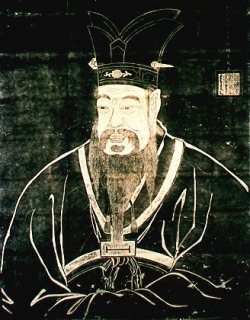
Confucius (which originally comes from the name Kung-fu- tzu or “Master Kung”) is thought to have been born around 551B.C. in a state called Lu in China. (For those of you familiar with the area, that’s the modern day province of Shandong.) The poor kid had what some would call a bit of a rough childhood. He not only lost his warrior-father at the tender age of three, but was rumored to be an ugly little guy, who grew into a man that wasn’t exactly offered any modeling jobs for Calvin Klein. But, ox lips or not, what he lacked in looks he made up for in brains and talent. Although he and his mom aren’t thought to have been that well off financially, Confucius grew up engulfed in his studies which spanned all sorts of things including etiquette, archery, math, poetry, history, music, and even charioteering.
At the age of 19 Confucius married a lady he eventually had children with. Not much else is known about his girl so some scholars conclude that the marriage didn’t work out, which I don’t think is quite fair because really there’s no evidence one way or the other. Regardless however, Confucius went on to become a teacher and a very good one at that. He is said to have been the first private teacher in China and accepted (male) students from all social classes rather than just the upper class, which was still a bit revolutionary back in those days. He not only educated his students in a book smart sort of way but also tried to help them develop into what he called a junzi which means exemplary person or superior man.
Besides his teaching gig, Confucius also harbored a lifelong dream of a career in politics. Although he did get the job of chief justice of a town (which was said to blossom under his leadership) he never really made it to the big leagues during his lifetime. He always remained a bit disappointed about that aspect of his life because he is said to have believed that if he were in a position of high enough authority he could have fixed society as a whole. After his chief justice gig, he became a wandering sage, more in an effort to find a ruler that would wise up and take his advice than for the sake of being a wandering sage. Although that didn’t bear a lot of fruit during his lifetime, Confucius’ teachings did eventually get recognized to say the least and were the basis for Chinese thought and philosophy for thousands of years thereafter.
Although a wise teacher, Confucius never claimed to be anything more and isn’t thought of as a god, saint, or miracle-worker like the founders of some other religions. He was simply an amazing teacher who described himself as a transmitter of ancient teachings and thoughts, which he was able to pull together into a pretty amazing structure for life, society, and the art of being human.
At the age of 19 Confucius married a lady he eventually had children with. Not much else is known about his girl so some scholars conclude that the marriage didn’t work out, which I don’t think is quite fair because really there’s no evidence one way or the other. Regardless however, Confucius went on to become a teacher and a very good one at that. He is said to have been the first private teacher in China and accepted (male) students from all social classes rather than just the upper class, which was still a bit revolutionary back in those days. He not only educated his students in a book smart sort of way but also tried to help them develop into what he called a junzi which means exemplary person or superior man.
Besides his teaching gig, Confucius also harbored a lifelong dream of a career in politics. Although he did get the job of chief justice of a town (which was said to blossom under his leadership) he never really made it to the big leagues during his lifetime. He always remained a bit disappointed about that aspect of his life because he is said to have believed that if he were in a position of high enough authority he could have fixed society as a whole. After his chief justice gig, he became a wandering sage, more in an effort to find a ruler that would wise up and take his advice than for the sake of being a wandering sage. Although that didn’t bear a lot of fruit during his lifetime, Confucius’ teachings did eventually get recognized to say the least and were the basis for Chinese thought and philosophy for thousands of years thereafter.
Although a wise teacher, Confucius never claimed to be anything more and isn’t thought of as a god, saint, or miracle-worker like the founders of some other religions. He was simply an amazing teacher who described himself as a transmitter of ancient teachings and thoughts, which he was able to pull together into a pretty amazing structure for life, society, and the art of being human.
Teachings of Confucius
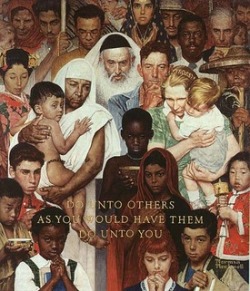
The golden Rule and Relationships
Most of the teachings of Confucius concern themselves with relationships and the best ways to make them work. This includes everything from how to run a successful government to how to be a good friend, to how to have a healthy family. Confucians believe in harmony and balance and that all things and people depend on one another to achieve a healthy society, which is one of the main goals.
A good place to start in attempting to understand the teachings of Confucius is his version of “The Golden Rule.” While many think of it as a Christian value, most major religions actually have some form of it and this is one of it’s earliest known appearances. The only difference here is that while Christ says “do unto others as you would have them do unto you.” Confucius phrased it, “Do not do unto others what you would not have them do unto you.”
Regardless the main idea here is the principle of reciprocity which is supposed to create good relationships. Confucius identifies the 5 main relationships as:
Parent-Child- Filial piety (respect for parents) was hugely emphasized in Confucius’ teachings because the relationship with our parents is the first one we experience and therefore the root of character and virtue. Parents and elders are held in very high regard in Chinese culture and are to be obeyed no matter what the age of the children. Children are also expected to care for their parents even after death. Ancient Chinese philosophy believed that the dead still had influence over the living, therefore the children of the deceased where expected to carry out various rituals and sacrifices.
Elder brother/Younger brother- In Chinese culture the elder brother took the position of the father in the household if he was killed. The younger brothers and sisters were expected to obey him just as they would a father.
Husband/Wife- The husband was expected to support the wife and she in turn serve and support him. Wives were also expected to give the husband children and men where allowed to take another wife if she failed to. Confucius viewed the purpose of sex as to conceive children, specifically sons and being overly sexual was so looked down upon that it was a valid reason to remove a ruler from the throne.
Friend/Friend- Pretty self-explanatory, friends where expected to treat each other with mutual respect. This was the only relationship where there wasn't a clear "boss".
Ruler/ subject- Rulers were expected to rule fairly and in the image of heaven, and in turn subjects where to serve and respect them. Confucius lived in a time of political upheaval so much of his teaching was an attempt to generate the basis for a balanced society. He believed that a ruler should be the calm center around which the universe of his kingdom revolved and that a good leader could always expect the loyalty of his subjects.
As you can see, while there is a pretty clear authority figure in most of these relationships, both sides of all of them come with mutual responsibility. Remember, Confucianism is based on harmony and each person in any given relationship is expected to live up to their side of the bargain.
Most of the teachings of Confucius concern themselves with relationships and the best ways to make them work. This includes everything from how to run a successful government to how to be a good friend, to how to have a healthy family. Confucians believe in harmony and balance and that all things and people depend on one another to achieve a healthy society, which is one of the main goals.
A good place to start in attempting to understand the teachings of Confucius is his version of “The Golden Rule.” While many think of it as a Christian value, most major religions actually have some form of it and this is one of it’s earliest known appearances. The only difference here is that while Christ says “do unto others as you would have them do unto you.” Confucius phrased it, “Do not do unto others what you would not have them do unto you.”
Regardless the main idea here is the principle of reciprocity which is supposed to create good relationships. Confucius identifies the 5 main relationships as:
Parent-Child- Filial piety (respect for parents) was hugely emphasized in Confucius’ teachings because the relationship with our parents is the first one we experience and therefore the root of character and virtue. Parents and elders are held in very high regard in Chinese culture and are to be obeyed no matter what the age of the children. Children are also expected to care for their parents even after death. Ancient Chinese philosophy believed that the dead still had influence over the living, therefore the children of the deceased where expected to carry out various rituals and sacrifices.
Elder brother/Younger brother- In Chinese culture the elder brother took the position of the father in the household if he was killed. The younger brothers and sisters were expected to obey him just as they would a father.
Husband/Wife- The husband was expected to support the wife and she in turn serve and support him. Wives were also expected to give the husband children and men where allowed to take another wife if she failed to. Confucius viewed the purpose of sex as to conceive children, specifically sons and being overly sexual was so looked down upon that it was a valid reason to remove a ruler from the throne.
Friend/Friend- Pretty self-explanatory, friends where expected to treat each other with mutual respect. This was the only relationship where there wasn't a clear "boss".
Ruler/ subject- Rulers were expected to rule fairly and in the image of heaven, and in turn subjects where to serve and respect them. Confucius lived in a time of political upheaval so much of his teaching was an attempt to generate the basis for a balanced society. He believed that a ruler should be the calm center around which the universe of his kingdom revolved and that a good leader could always expect the loyalty of his subjects.
As you can see, while there is a pretty clear authority figure in most of these relationships, both sides of all of them come with mutual responsibility. Remember, Confucianism is based on harmony and each person in any given relationship is expected to live up to their side of the bargain.
Yin and Yang
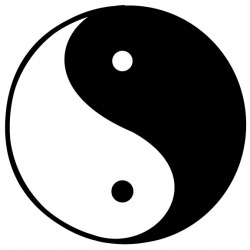
Though this concept is basic to Confucianism (as well as Taoism), it was around long before Confucius came along. Yin and Yang is an ancient tradition that holds that there are opposing forces in the world which balance each other out and therefore create harmony. The yang traditionally represents ideas such as: hot, dry, male, light and the yin are things like: darkness, female, moist, ect. The point being that for anything to exist, it’s opposite must as well. I’ve also heard this applied to good and evil, though neither of these forces is specifically meant to represent evil. Many people ask “why does evil exist in the world?” The best answer I’ve ever heard is that only as much good can exist as there is evil. If there where no evil, what would good be the opposite of? For as much love as there is in the world, there must be as much a capacity for hate as well.
Ren and Li
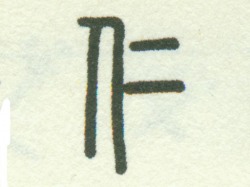
Ren (which I’ve also seen spelled Jen) and Li are two big principles in Confucianism. Jen is kinda hard to translate, but most people describe it as human-heartedness which includes the qualities of courage, love, compassion, courtesy, ect. What I like to think of as Jen is the feeling you get when you help someone in need or any or the other acts of kindness and compassion that make it so beautiful to be human. Jen is very prized in Confucianism and is one of the reasons society is so stressed, since it is impossible to cultivate virtue alone. Ren is also very important in politics, the idea being a ruler who exhibits good Ren will rule humanely over his subjects who will in turn obey him. A ruler who did not express good Ren however risked loosing the “mandate of heaven” which was more or less his right to rule.
Li is simply put, knowing the right thing to say or do in any given situation. It covers everything from ritual situations to common etiquette and can come in very handy in social situations. For example, meeting your girlfriend or boyfriends successful lawyer parents for the first time? Good Li= bringing them a nice bottle of wine. Bad Li= Bringing them 5 pack of Bud, explaining that you taste tested one on the way.
Another of the positives of developing these standardized behaviors, Confucius argued, was a unique approach to governing social behavior. Confucius noted that the way society usually works, when someone breaks a law they are punished after the law is broken. The idea here is that hopefully they will not break the law, whether or not they know the reason for it. He argued however that if everyone was brought up with the same set of social expectations, they would become internalized and have an effect before the law was broken, preventing the person from doing a crime for fear of the shame that would result.
Li is simply put, knowing the right thing to say or do in any given situation. It covers everything from ritual situations to common etiquette and can come in very handy in social situations. For example, meeting your girlfriend or boyfriends successful lawyer parents for the first time? Good Li= bringing them a nice bottle of wine. Bad Li= Bringing them 5 pack of Bud, explaining that you taste tested one on the way.
Another of the positives of developing these standardized behaviors, Confucius argued, was a unique approach to governing social behavior. Confucius noted that the way society usually works, when someone breaks a law they are punished after the law is broken. The idea here is that hopefully they will not break the law, whether or not they know the reason for it. He argued however that if everyone was brought up with the same set of social expectations, they would become internalized and have an effect before the law was broken, preventing the person from doing a crime for fear of the shame that would result.
Education
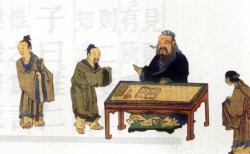
Education was one of the cornerstones of Confucian belief, but was more about cultivating yourself as a person and member of society than learning advanced Algebra. Due to the emphasis on self-cultivation and developing moral perfection, Confucius’ students where likely to be found learning rituals, studying ancient wise teachings, and all around improving themselves as people.
Here again, relationship to society was essential because Confucius believed that our relationships to others where the way to both become fully human and change the world. The idea is that if everyone became who they were meant to be, we would all begin to impact and change society as a whole.
Here again, relationship to society was essential because Confucius believed that our relationships to others where the way to both become fully human and change the world. The idea is that if everyone became who they were meant to be, we would all begin to impact and change society as a whole.
Knowing your placE
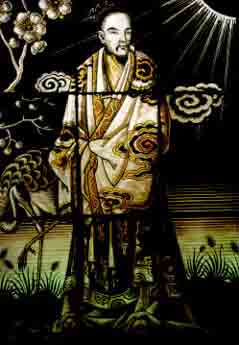
This is one of the hardest concepts of Confucianism for Westerners and especially those raised in a “you can be whatever you want to be” democracy. Confucius believed very strongly that everyone should understand their place in the hierarchy of society and stay there. For example if you were a peasant, your job was to be the best peasant you could be. As Confucius himself put it, “Let the ruler be a ruler, the subject a subject, the father a father, the son a son.” He believed that most of the disharmony in society came from people either not knowing their place or trying to change it.
However Confucius’ idea here was different than say the Hindu caste system which allows others to be looked down on and mistreated due to bad ‘karma’. Confucius’ train of thought here was that if everyone did their jobs as they where actually designed, what would result would be a sort of utopia where everybody had a good job and nice house and there would be no need for social conflict. In other words, just because you were lower class didn’t mean you had to sacrifice your respect.
In fact Confucius is thought to be one of the first to suggest one world government and society called the “Great Commonwealth”. He insisted that this would be a world where everyone operated out of mutual respect and where there would be no need for locked doors. He felt that if everyone was happy there would be no need for rebellion or fighting.
He wasn’t completely naive however, as seen from his 3 essentials of good government which included adequate weapons, food, and confidence of the people.
However Confucius’ idea here was different than say the Hindu caste system which allows others to be looked down on and mistreated due to bad ‘karma’. Confucius’ train of thought here was that if everyone did their jobs as they where actually designed, what would result would be a sort of utopia where everybody had a good job and nice house and there would be no need for social conflict. In other words, just because you were lower class didn’t mean you had to sacrifice your respect.
In fact Confucius is thought to be one of the first to suggest one world government and society called the “Great Commonwealth”. He insisted that this would be a world where everyone operated out of mutual respect and where there would be no need for locked doors. He felt that if everyone was happy there would be no need for rebellion or fighting.
He wasn’t completely naive however, as seen from his 3 essentials of good government which included adequate weapons, food, and confidence of the people.




